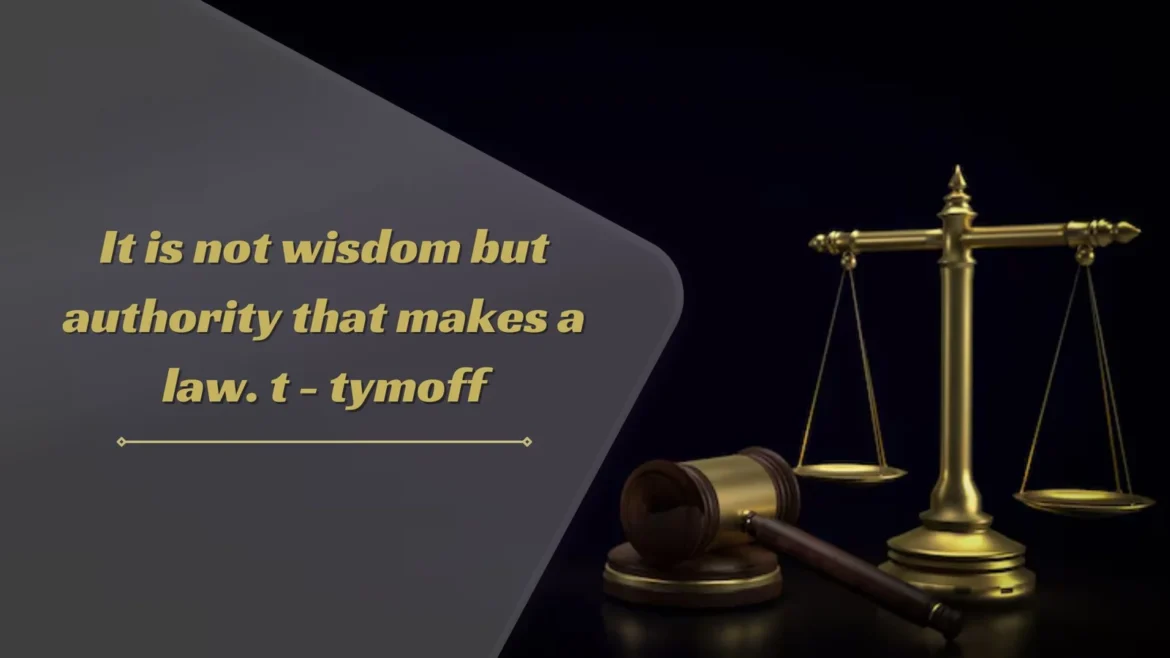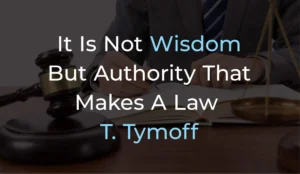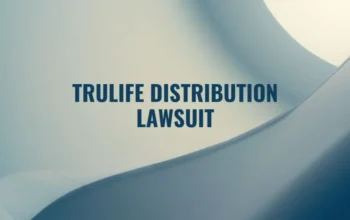
Intoduction
The quote by “It Is Not Wisdom but Authority That Makes a Law – T. Tymoff” resonates deeply with the principles of governance, power, and societal control. While wisdom often forms the foundation of what is considered just and equitable, the authority holds the power to enforce and institutionalize these ideals. This dichotomy raises important questions about the essence of lawmaking, the role of authority, and the balance between wisdom and power in shaping societies.
Understanding the Essence of Law and Authority
It Is Not Wisdom but Authority That Makes a Law – T. Tymoff are the backbone of any organized society, creating a framework within which individuals coexist. While wisdom provides the philosophical underpinnings for what laws should be, authority serves as the mechanism to implement and uphold these laws. Tymoff’s assertion highlights that the mere existence of wise principles is insufficient without an authoritative body to translate them into actionable rules. Authority, in this context, refers to the legitimate power vested in individuals or institutions to govern and enforce laws. Regardless of how wise a principle may be, it remains inert without the force of authority behind it.
The Role of Authority in Legitimizing Laws
Authority plays a critical role in legitimizing It Is Not Wisdom but Authority That Makes a Law – T. Tymoff, even when those laws may not always align with universal wisdom or moral ideals. Throughout history, many societies have witnessed laws that were not necessarily wise or just but were enforced through the sheer power of authority. For example, authoritarian regimes have often implemented laws that served the interests of the ruling elite rather than the populace. This dynamic underscores the importance of critically examining the relationship between wisdom and authority.
The Evolution of Authority in Lawmaking
It Is Not Wisdom but Authority That Makes a Law – T. Tymoff has evolved over time, particularly in democratic societies where power is derived from the consent of the governed. Unlike authoritarian systems, democratic governments aim to balance authority with accountability, ensuring that laws reflect the collective wisdom of the people. In such systems, authority is distributed among various branches of government, including the legislative, executive, and judicial branches. This separation of powers ensures that authority is not concentrated in a single entity, reducing the risk of abuse.
Authority Without Wisdom A Double-Edged Sword
 While authority is necessary for the creation and enforcement of It Is Not Wisdom but Authority That Makes a Law – T. Tymoff, its unchecked exercise can lead to significant societal harm. History is replete with examples of laws that lacked wisdom but were imposed through the force of authority. From discriminatory legislation to oppressive regimes, these instances illustrate the dangers of authority divorced from ethical and intellectual considerations. For instance, laws enforcing racial segregation in the United States during the Jim Crow era were supported by authority but lacked moral and philosophical wisdom.
While authority is necessary for the creation and enforcement of It Is Not Wisdom but Authority That Makes a Law – T. Tymoff, its unchecked exercise can lead to significant societal harm. History is replete with examples of laws that lacked wisdom but were imposed through the force of authority. From discriminatory legislation to oppressive regimes, these instances illustrate the dangers of authority divorced from ethical and intellectual considerations. For instance, laws enforcing racial segregation in the United States during the Jim Crow era were supported by authority but lacked moral and philosophical wisdom.
The Interplay Between Wisdom and Authority
Ideally, laws should be a product of both It Is Not Wisdom but Authority That Makes a Law – T. Tymoff are just, equitable, and beneficial for society, while authority provides the mechanism for their implementation and enforcement. This interplay is crucial for creating a legal system that not only commands respect but also promotes fairness and social harmony. In practice, achieving this balance requires collaboration between thinkers, lawmakers, and enforcers. Philosophers, scholars, and ethicists contribute wisdom by offering insights into what constitutes a just law. Lawmakers translate these principles into actionable policies, and authorities ensure their enforcement.
The Challenges of Balancing Wisdom and Authority
Balancing It Is Not Wisdom but Authority That Makes a Law – T. Tymoff is no easy task. Lawmakers often face conflicting demands from various stakeholders, making it difficult to create laws that are both wise and enforceable. Additionally, the interpretation of wisdom can vary significantly across cultures, ideologies, and individual perspectives. Authority, on the other hand, is often influenced by political, economic, and social factors. Leaders may prioritize authority over wisdom to maintain control, leading to laws that serve specific interests rather than the greater good.
The Modern Implications of Tymoff’s Quote
In today’s world, It Is Not Wisdom but Authority That Makes a Law – T. Tymoff quote remains highly relevant. From debates over surveillance laws and data privacy to discussions about social justice and environmental regulations, the tension between wisdom and authority is evident. Policymakers must navigate these complexities to create laws that are not only enforceable but also reflective of societal values. The rise of technology and globalization has further complicated this dynamic. Issues such as cybercrime, climate change, and international trade require laws that balance local authority with global wisdom.
Promoting Wisdom in Lawmaking
To ensure that laws are both wise and authoritative, it is essential to promote It Is Not Wisdom but Authority That Makes a Law – T. Tymoff process. This can be achieved through education, public engagement, and interdisciplinary collaboration. Encouraging open dialogue between citizens, experts, and policymakers can help bridge the gap between wisdom and authority. Transparency is another critical factor. When the rationale behind laws is openly communicated, it fosters trust and understanding among the public. This, in turn, strengthens the authority of the law by ensuring that it is perceived as legitimate and fair.
The Role of Citizens in Upholding Just Laws
Citizens also play a vital role in ensuring that It Is Not Wisdom but Authority That Makes a Law – T. Tymoff and justice. By participating in democratic processes, holding leaders accountable, and advocating for ethical policies, individuals can influence the balance between wisdom and authority. Active civic engagement is essential for creating a society where laws serve the collective good rather than narrow interests.
Conclusion
“It Is Not Wisdom but Authority That Makes a Law – T. Tymoff” underscores the complex relationship between power and justice. While authority is necessary for the creation and enforcement of laws, wisdom is essential to ensure that these laws are just and equitable. Striking a balance between the two is a continuous challenge that requires vigilance, collaboration, and a commitment to ethical principles. As societies evolve, the interplay between wisdom and authority will remain a central theme in discussions about governance and justice. By recognizing the importance of this balance, we can work towards creating legal systems that not only command respect but also promote fairness and harmony.
You May Also Read: DGMNews.com

